
New Delhi, June 29: Taking charge of the Finance portfolio after the resignation of Pranab Mukherjee, Prime Minister Manmohan Singh has kindled hopes of a rethink on the controversial tax measures the departing Minister leaves behind.
While the Finance Ministry maintained on Thursday that there were no plans to defer the roll-out of the General Anti-Avoidance Rules (GAAR) beyond April 1, 2013, it said it was committed to providing “clarifications” to the PMO within two or three weeks on tax matters, which have raised the hackles of industry ever since the budget was presented.
Besides transfer pricing issues, the clarifications, in particular, would pertain to the retrospective amendment of Section 9 of the Income Tax Act — now popularly known as the Vodafone tax — which now forms apart of the Finance Act, 2012, on enactment of the Finance Bill.
Speaking to journalists, after another meeting with the Prime Minister a day after Dr. Singh in his review meeting with top Finance Ministry officials referred to “problems on the tax front which need to be addressed” as they were among the “many factors that have contributed to this general negative mood,” Finance Secretary R.S. Gujral said: “The Prime Minister’s Office sought clarifications on taxation issues and Section 9 of the Income Tax Act [related to tax on indirect transfer of assets]... We asked them to give us two-three weeks’ time.”
Under the amended provisions of Section 9 of the I-T Act, 1961, with retrospective effect, Vodafone would now be liable to pay about Rs. 20,000 crore (including interest), if and when a tax demand is raised by the authorities, though the British telecom major had won its case in the Supreme Court under the earlier legal framework.
While not giving any indication as to whether clarifications on the retrospective tax law were likely to result in any softening of the government’s stance, compared with what obtained when Mr. Mukherjee was Finance Minister, Mr. Gujral, who also heads the Revenue Department, sought to scotch speculation on deferment of the GAAR beyond April next year, as was indicated by the Finance Minister in his reply during the debate on the budget.
There is “no deferment... the GAAR is staying,” Mr. Gujral said, pointing out that the Finance Ministry would shortly issue draft explanatory guidelines on the GAAR for public comments. “We have finalised the GAAR draft rules after three meetings with the stakeholders. The draft will have examples for what would be deemed as permissible and impermissible arrangement.”
Late at night, the Central Board of Direct Taxes (CBDT) went into fast-forward mode to clear the confusion in the minds of foreign investors and issued a 23-page draft guidelines on the implementation of the GAAR in terms of Section 101 of the I-T Act with illustrative examples of cases, in which the provisions of the law would be invoked.
“The GAAR will be applicable for income arising from April 1, 2013. Certain grey areas have been highlighted. We need to clear the legislative intent of the proposal,” Mr. Gujral said. He pointed out that stakeholders would have 15 days to offer comments on the draft rules, after which the Finance Ministry would come out with the final guidelines.




Comments
Add new comment